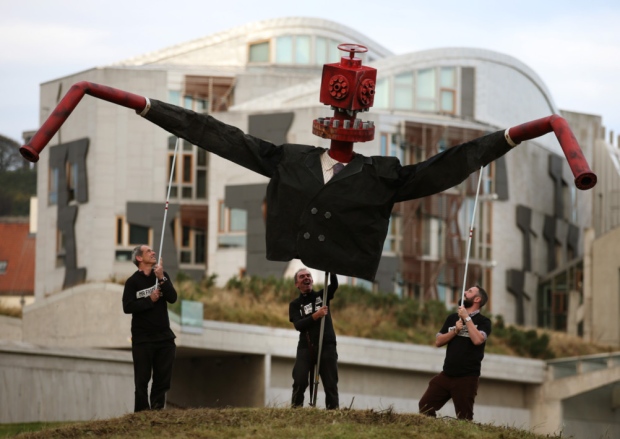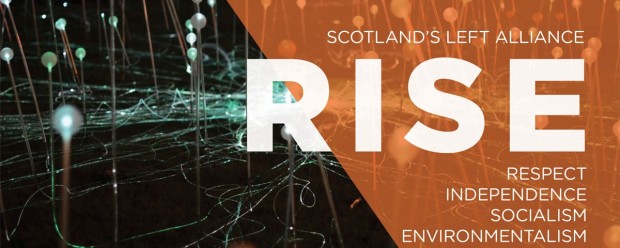This week, we put the topical question of “What is your opinion of the moratorium on fracking and UCG?” to our contributors, but before we get into their responses, a little background is necessary.
In January the SNP government announced a moratorium on the process of fossil fuel extraction known as hydraulic fracturing or fracking, while around ten days ago they announced a similar moratorium on the similarly controversial process of offshore underground goal gasification (UCG).
A moratorium basically means that the processes are illegal in Scotland other than for research purposes until the government is satisfied that they are safe and of benefit to the country.
Earlier this weekend, the SNP conference debated the moratorium and a narrow vote was cast in favour of the current moratorium, which was initially reported as a vote against a full ban, although the truth is a little more complex and well covered here.
Both of these processes are strongly opposed by environmental and community groups because of a history of pollution and seismic instability associated with the practices when used overseas, with the fossil fuel lobby making the case for the legalization of the processes.
Siobhan Tolland: I am going to make this short. It is phenomenal that fracking and UCG can EVER be be portrayed as good for the environment and people unless your sole aim is profit. Pumping Hydrochloric Acid deep into the earth is poisoning it, for instance, pure and simple. Stop fannying around with a Moratorium and ban it. End of story! Anything less is ecological suicide.
Chris Napier: On one hand, having a moratorium on fracking and UCG is a good thing. However, it’s not close to as much of a good thing as an actual ban – as demanded by both public opinion and scientific evidence – would be.
I can’t help but think that the moratorium is essentially a way for the SNP to continue adopting the look of a progressive party which cares about the environment and public opinion until the election in May next year. After that near inevitable victory, I expect they will show their true colours as a pro-business party who are inextricably invested in the fossil fuel industry and announce that fracking & UCG is suddenly OK.
The fact that Ineos have bought up a chunk of North Sea oil, been allowed to start drilling for ‘investigative purposes’ under the moratorium (as if the weight of scientific evidence from overseas wasn’t sufficient) and paid a hefty sum for a stall at the SNP’s conference all indicate that they are investing heavily in the Scottish fossil fuel industry and they wouldn’t be doing this if they hadn’t been given some sign that they’ll get to frack us in the end.
This is another serious crack in the SNP’s image as a progressive party which has me seriously considering whether I can in all conscience vote for them in the constituency ballot in May.
Louise Wilson: Well, well, well. After numerous calls for a total ban, even from many of their own members, the SNP is still sat on the fence on fracking. I can’t help but worry that Chris is right.
The justification for this is that there needs to be full and extensive research into the impacts of fracking (which I’m sure will come out with “as long as it’s done right, THE MONEY”) – and completely ignores that non-Scottish literature out there already.
But aside from all the fracking-specific issues that have been raised (contamination, house prices decreasing, mini-earthquakes), this also completely ignores one blatantly obvious fact: shale gas is a fossil fuel.
Put simply, we cannot afford to allow fracking and UCG to go ahead because, even without the short-term impacts, we cannot keep renewing our reliance on finite resources. Most political parties in the UK accept this already – yet not many seen to actually understand what that means in terms of decisions needed now.
So to come back to the original question, my opinion is this: the moratorium needs to go. Bring on the full ban – and soon.
Alasdair Duke: The issues of climate change and unconventional fossil fuel extraction are too serious to have to compete for space in this piece against political point-scoring. There will be some criticism of the SNP later in this piece, but let’s start with what is wrong with fracking and so-called “unconventional gas extraction”.
Global warming is caused by a variety of gases of which the most significant is carbon dioxide. Carbon dioxide is created in various ways, but burning stuff, especially stuff with a high carbon content such as fossil fuels, is a leading cause of carbon dioxide emissions and therefore global warming.
We are on course for the world’s temperature to increase by around four degrees celsius by 2100. Consequently, at some point within a few generations, polar ice deposits will melt completely. There will be widespread drought and flooding, sea level rise will obliterate low-lying areas, and food and water supplies will be in a state of total crisis.
So… burning fossil fuels is always bad news.
Fracking and so-called “unconventional gas extraction” are the latest, and among the more desperate, of humanity’s attempts to literally burn the contents of our planet.
Mankind has always burned stuff. Primitive early humans developed the ability to light fires using wood. Our more recent ancestors turned to wax, paraffin and other fuels. The fossil fuel industry took off in the 1800s, at first by extracting what might be called “conventional” fuels; those which were on land and were fairly easy to extract using the technology of the time. In the twentieth century, as the price and our demand for oil increased, less “conventional” fuel extraction methods began to emerge. These included drilling under the sea, paying despot overseas governments for the chance to burn their fossil fuels, and fracking. More recently, there is oil and gas exploration in previously inaccessible or unviable places such as the Arctic regions; perversely, the shrinking of the ice caps has only encouraged Russia, Canada, the USA and others to search for oil in the far North.
As I write this in 2015, we have passed the point where the industrial-scale extraction of fossil fuels should ever be described as “conventional”. I gather from scientific consensus that the only conventional, rational approach that could safeguard the future of humanity is to leave it in the ground.
So it’s fair to say that I am opposed to all fracking and unconventional fossil fuel extraction. I am opposed to it in Scotland and I am opposed to it everywhere. Of course Scotland must set an example and ban fracking. We are an educated and wealthy nation that can set an example on this issue. I would also contend that we should go much further in tackling climate change; tackling topics such as transport, home insulation and seasonal/vegan food consumption.
The SNP appears craven. There are numerous factors that have long pulled the party towards the fossil fuel industry: chiefly, the centrality of oil to their arguments for Scottish independence, and the party’s power base in the North East of Scotland where the oil industry has transformed the local economy. The party has always maintained close connections to the fossil fuel lobby and continues to do so, despite the influx of tens of thousands of younger, more idealistic members since the referendum.
The SNP leadership, and in particular Alex Salmond, have gone to great lengths in recent years to appear “statesmanlike”: unifying, populist, disciplined and yet pragmatic. Something for everyone; a recognisable brand that the whole country could trust. But, faced with a stand-off between their chums in the fossil fuel lobby and those who believe in sustainability, the party came down on the side of short term economic self-interest. To hell with the long term.
There are many SNP members who will be disgusted by their party’s gradual U-turn towards fracking. Maybe they will try to drag their party away from this horrendous mistake. But for the casual voter, and for what remains of the Radical Independence Campaign, the game may be up.
Other political parties are available.
—
What is your opinion of the moratorium and the prospect of fracking/UCG being legalized or banned in Scotland? Let us know!










